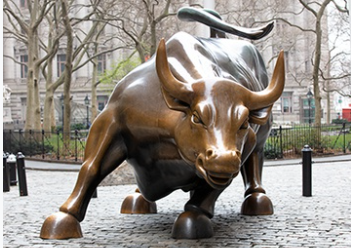
(Photo : wikimedia.org)
- Global stocks surged due to the anticipation of Trump's second term and a Federal Reserve policy decision.
- The S&P 500, Dow Jones, and Nasdaq Composite all hit record highs, while bond markets responded unfavorably.
- Political turmoil in Germany and central bank decisions in the UK, Norway, and Sweden also influenced the markets.
- The cryptocurrency market saw Bitcoin reach a record high, while oil prices slipped due to the U.S. presidential election.
Global stock markets experienced a significant surge on Thursday, November 7, 2024, with Wall Street shares hitting record highs. This development was largely attributed to investors processing the implications of a second Donald Trump presidency and the anticipation of a Federal Reserve policy decision. The Federal Reserve was expected to cut interest rates by 25 basis points at the end of its policy meeting on Thursday, a move that may seem minor given the uncertain economic landscape under a second Trump administration.
Steve Englander, head of global G10 foreign exchange research and North America macro strategy, stated, We think it more likely that the Federal Open Market Committee cuts by 25 bps, signaling that pauses could be appropriate at future meetings if inflation prospects deteriorate. This statement reflects the cautious optimism that permeated the market. The S&P 500 rose by 0.5%, the Dow Jones Industrial Average added 0.12%, and the Nasdaq Composite jumped 1.1%. All three indices hit new all-time highs for a second consecutive day.
The MSCI index for world stocks also climbed 0.8%, reaching a record high. In Europe, the broad STOXX 600 index was up 0.8% after Asian shares gained earlier in the day. Chinese blue chips rose by 3% as investor optimism over potential stimulus outweighed concerns about worsening trade tensions.
Global Market Reactions and Currency Fluctuations
Naomi Fink, chief global strategist at Nikko Asset Management, noted that stocks were rewarding the presumed likelihood of corporate tax cuts and perceiving a general penchant toward deregulation across industries as positive for earnings. However, bond markets responded unfavorably, with yields rising on the prospect of a united front between executive and legislative arms of government with respect to fiscal expansion.
This comes at a time when U.S. debt-to-GDP is already at historic highs near 120% and budget deficits already exceed 6% of GDP. The dollar fell 0.9% against a basket of its peers after logging its biggest one-day gain in more than two years on Wednesday. Traders said they were closing out profitable bets on the Trump presidency and ahead of the Fed's decision.
In Europe, political turmoil in Germany, where Chancellor Olaf Scholz sacked his Finance Minister Christian Lindner, caused the ruling three-party coalition to collapse and set the stage for a snap election. Deutsche Bank analysts said the developments could be positive for the euro due to the potential confidence boost from a more stable German government and the direct economic effects of a potentially more proactive fiscal stance.
Central Bank Decisions and Cryptocurrency Market
In the UK, the Bank of England cut interest rates by a quarter point on Thursday for only the second time since 2020, but said future reductions were likely to be gradual, as it saw higher inflation after the new government's first budget last week. Central banks in Norway and Sweden also held meetings on Thursday, though they met markets expectations and did little to disrupt currency markets.
In the cryptocurrency market, Bitcoin eased 0.3% to $75,408, following its vault to a record high $76,499.99 overnight. Trump had vowed to make the United States the crypto capital of the planet. Gold added 1.5%, following Wednesday's more than 3% tumble, to $2,698.14 an ounce. However, that was still not far from its recent record high of $2,790.15.
Oil prices slipped, extending a sell-off triggered by the U.S. presidential election, as a strong dollar and lower crude imports in China outweighed supply risks from a Trump presidency and output cuts caused by Hurricane Rafael. Brent crude oil futures fell 0.7% to $74.42 per barrel. U.S. West Texas Intermediate (WTI) crude shed 0.7% to $71.19.
* This is a contributed article and this content does not necessarily represent the views of btin.co.in









